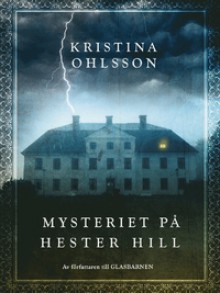Mysterier (Lanterne, Paperback) - Knut H...

I refused to read Hamsun for a long time, on the grounds that he was a Nazi sympathizer. But I started getting interested in modern Norwegian literature a couple of years ago, and in the end I had to give in. You just can't avoid him; he's referred to everywhere. And if I find him hard to deal with, I'm comforted by the fact that it's much worse for the Norwegians.
Let me expand on that a bit. I'm English by birth, and I've also lived a fair amount of my life in Sweden and the US. None of those countries have ever been occupied by a foreign power (people from the American South may disagree). We don't know what it's like, and it's difficult to understand from the outside. When you read books from countries like France and Norway, which have recently suffered the experience of being occupied, you start to get some idea. The best comparison I can find is that it's like being raped. It's a shameful and degrading thing that you don't want to talk about unless you have to.
Now, suppose that you're a woman who's been abducted by a psychopath who keeps you for years in his cellar, and comes down every now and then to rape and torture you. And then suppose that your big brother, whom you've always loved and admired, gets friendly with the rapist. He visits every now and then. You're lying there bruised and bleeding in the cellar, and you can hear your brother and the rapist laughing together and playing cards in the kitchen above you. It was rather like that with Hamsun and the Norwegians. He was their greatest living author. Everyone had read him; Norwegians are an exceptionally literate people. During World War II, while Norway was occupied, Hamsun expressed his deep admiration for the Nazis. He gave his Nobel medal to Goebbels, and he met Hitler. When Hitler killed himself, Hamsun wrote him a flattering obituary. You can understand the scene in Christensen's
Halvbroren, where the grandmother, a sympathetic character, burns all Hamsun's works in her stove. But the same book constantly mentions Hamsun's novels, and the author makes it clear how deep his artistic debt is. Jan Kjærstad, in
Forføreren, has similar problems. The section on Hamsun is very interesting.
After the war, the Norwegian government simply didn't know what to do. Their solution was to determine that Hamsun was legally insane. He was also fined a large amount of money. Well, they may have been right. To the extent that the word "insane" means anything, I agree. But it was an unusual form of insanity. Hamsun had an unparalleled ability to project his feelings so that other people could experience them too; when I read
Mysterier, it was almost as though I had gone through Doctor Parnassus's magic mirror, and found myself inside his crazed mind. Or, to use another analogy, remember the sequence from
Mary Poppins where Bert and the kids jump into the picture; but instead of the anodyne country scene that Bert has drawn on the sidewalk, imagine that they have leaped into one of Van Gogh's last paintings. It's an unpleasant and frightening book, but a remarkably powerful one.
The language is extraordinary. Here are two passages I particularly liked, with my translations.
Det minder mig litt om en nat på Middelhavet, på kysten av Tunis. Det var vel hundrede passagerer ombord, et sangkor som kom fra Sardinien et sted. Jeg hørte ikke til selskapet og kunde ikke synge, jeg sat bare på dækket og hørte på mens koret sang nedenunder i salonen. Det varte næsten hele natten; jeg skal aldrig glemme hvor det lydde godt i den lumre nat. Jeg trek i smug alle dører til salongen i; tættet sangen inde, så å si, og så var det som lyden kom fra havsbunden, ja som om skibet skulde gå ind i evigheten med brusende musik. Tenk Dem noget i retning av et hav fuldt av sang, et underjordisk kor.
Frøken Andresen som satt Nagel nærmest sa uvilkårlig:
Ja Gud hvor det måtte være deilig!
It reminds me a little of a night I once experienced on the Mediterranean, off the coast of Tunis. There were a hundred or so passengers on board, a choir who came from somewhere in Sardinia. I wasn't in their party and I couldn't sing myself, I just sat there on the deck and listened while the choir sang underneath me in the saloon. They sang nearly all night; I will never forget how wonderful it sounded in the warm darkness. I sneaked down and closed all the doors; concentrated the essence of the song, as it were, and it was as though the sound came from the bottom of the sea, as though the ship was sailing into eternity on the music. Imagine something like a sea full of singing, an underwater choir.
Frøken Andresen, who was sitting closest to Nagel, said involuntarily:
"Oh my God, it must have been so beautiful"
And later, in the scene which I think explains the title:
Stemmen er en farlig apparat. Forstå mig ret: jeg mener ikke netop stemmens materielle lyd, den kan være høi eller lav, klangfuld eller rå, jeg mener ikke det stemmestofelige, tonetillværelsen, nei jeg holder mig til mysteriet bak den, den verden som den utgår från ... Til helvete forresten med denne verden bak! Altid ska det være en verden bak! Hvad fan raker det mig?
The voice is a dangerous instrument. Understand me correctly: I don't mean simply the material quality of the sound, whether it's high or low, melodious or harsh. I don't mean the acoustic or prosodic properties. I'm talking about the mystery behind it, the world it comes from... Oh, never mind, fuck the world behind it! There's always supposed to be a world behind things! What's it got to do with me?
I'm not sure what this means, to be honest, but I feel it's saying something important. Maybe someone can explain it to me. Mostly, I feel relieved to have escaped intact from the Imaginarium.


 Log in with Facebook
Log in with Facebook 









